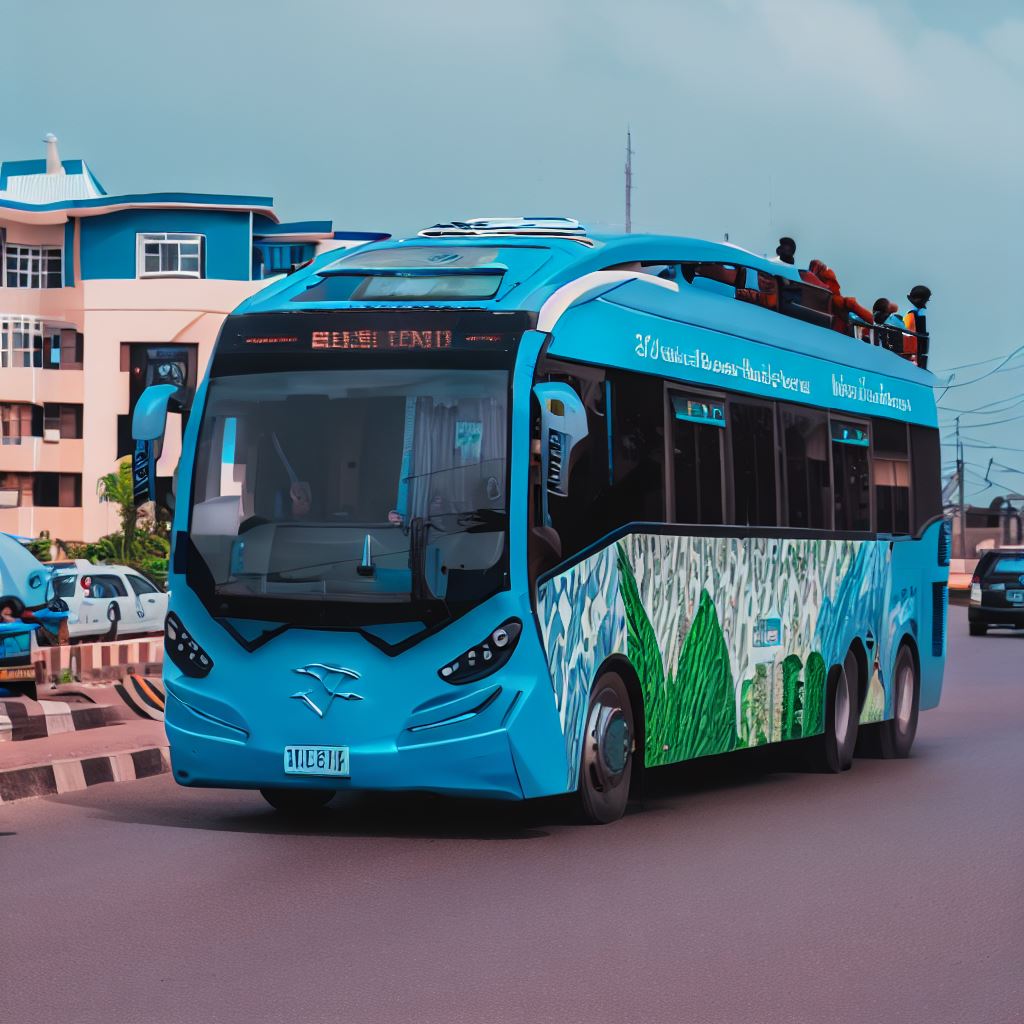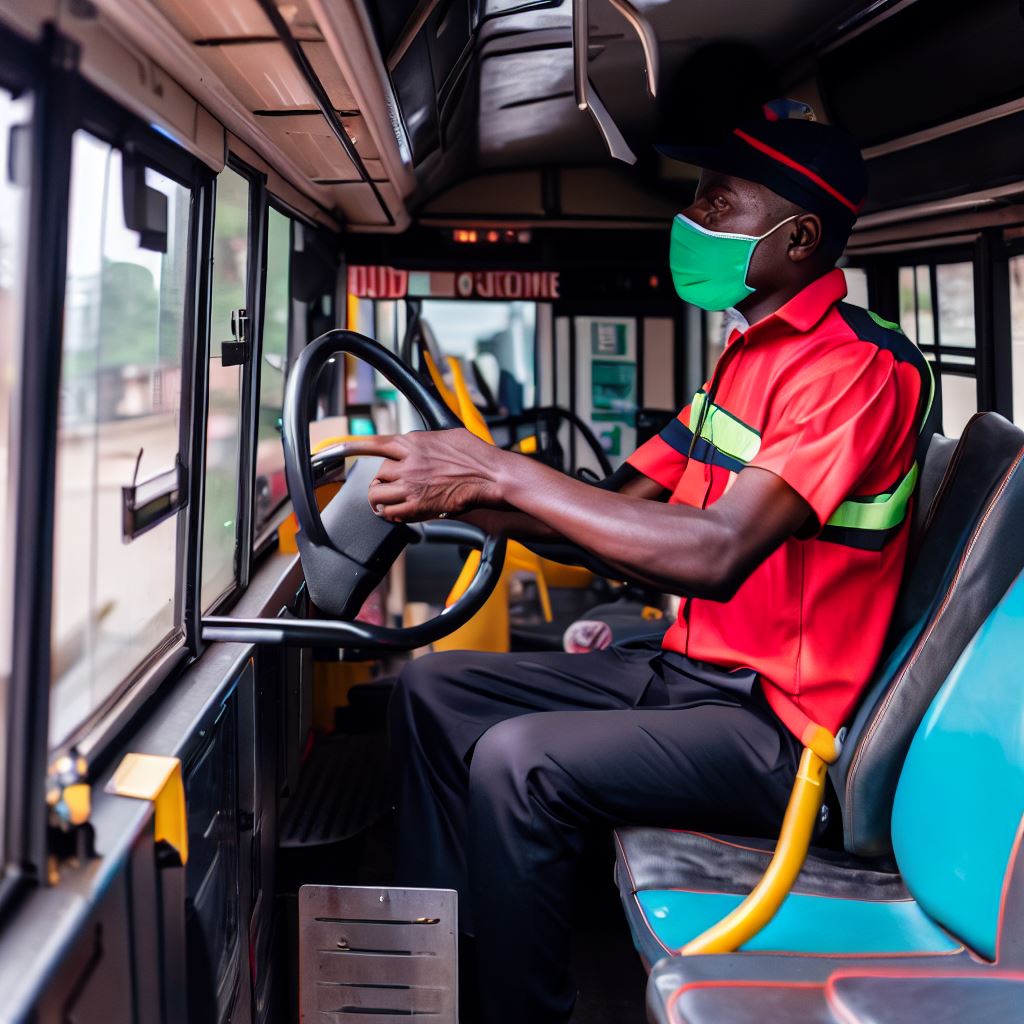Introduction
Rural to Urban Transit in Nigeria: The Need for Improved Public Transportation
In Nigeria, the issue of rural to urban transit is of utmost importance.
The country is experiencing rapid urbanization, with increasing numbers of people moving from rural areas to urban centers.
This migration has resulted in significant challenges in transportation infrastructure and efficiency.
Importance of Efficient Public Transportation
Efficient public transportation plays a crucial role in addressing these challenges.
It ensures easy access to job opportunities, education, healthcare, and other essential services for both rural and urban dwellers.
Moreover, it helps reduce traffic congestion, air pollution, and the overall carbon footprint.
Focus of the Blog Post: Opportunities in Nigerian Buses
This blog post will focus on exploring the opportunities that exist within the Nigerian bus transportation sector.
Buses are a vital mode of public transportation in Nigeria, serving millions of commuters daily.
By identifying the potential for improvement and innovation, we can better address the transit needs of the rural to urban population.
Stay tuned to discover the various possibilities and advancements in Nigerian buses that can revolutionize public transportation in the country.
From infrastructure development to technology integration, we will delve into the promising opportunities that lie ahead.
Challenges of Rural to Urban Transit in Nigeria
Discuss the current state of rural transportation infrastructure
- Rural areas in Nigeria often lack proper transportation infrastructure.
- Limited or poorly maintained roads make commuting difficult and time-consuming.
- The lack of public transportation systems in rural areas hinders mobility for residents.
- Inadequate bridges and waterways further impede transportation in rural communities.
- Insufficient funding and low prioritization from the government contribute to the poor state of rural transportation infrastructure.
Highlight the difficulties faced by individuals traveling from rural to urban areas
- Many individuals in rural areas face challenges accessing urban areas due to transportation constraints.
- Limited transportation options result in long waiting times and delays for rural commuters.
- High transportation costs burden individuals traveling from rural to urban areas, especially low-income earners.
- Lack of reliable transportation systems limits employment and education opportunities for rural residents.
- Poor road conditions and overcrowded vehicles pose safety risks for those traveling from rural to urban areas.
Explain the limitations of existing transportation options
- Existing public transportation options from rural to urban areas are often unreliable and infrequent.
- Limited routes and schedules make it difficult for individuals to plan their commutes effectively.
- Insufficient seating capacity in public buses forces commuters to stand or overcrowd vehicles.
- Inadequate maintenance of public transportation vehicles leads to frequent breakdowns and service interruptions.
- Absence of alternative transportation modes, such as trains or light rail systems, further limits options for rural-to-urban transit.
The hurdles of rural to urban transit in Nigeria are deeply intertwined with the state of rural transportation infrastructure.
Dilapidated roads, coupled with a dearth of public transit systems, hinder rural dwellers from accessing urban hubs. Inadequate bridges and waterways exacerbate the situation, particularly during rainy seasons.
Travelers from rural to urban areas grapple with extended wait times and delays due to limited options.
Exorbitant transportation costs weigh heavily on those with modest incomes, restricting their access to urban centers.
Transform Your Career in Nigeria
Discover unmatched expertise with our personalized Career Consulting service. Navigate Nigeria’s job market with a strategy tailored just for you.
Get StartedConsequently, limited prospects in employment and education thwart rural socioeconomic growth.
To unlock the potential of rural-urban transit, there must be a concerted effort to enhance rural transportation infrastructure, establish reliable public transportation networks, and expand transit options beyond buses.
This necessitates substantial investments and governmental focus, ultimately bridging the gap and fostering equal opportunities for all Nigerian residents.
The Emergence of Nigerian Buses
Describe the recent rise in Nigerian bus services
- Over the past decade, Nigeria has experienced a significant growth in its bus services.
- The rise in population and urbanization has led to an increased demand for efficient transportation.
- Private companies and entrepreneurs have seized this opportunity and established their own bus services.
- These buses are now a common sight on the streets, connecting rural areas to urban centers.
Identify the key players in the Nigerian bus industry
- One of the major players in the Nigerian bus industry is the government-owned Nigerian Road Transport Corporation (NRTC).
- Private companies such as ABC Transport, God is Good Motors, and Peace Mass Transit also dominate the sector.
- These companies operate a large fleet of buses and provide various intercity and interstate transportation services.
- The market is highly competitive, with new players entering the industry to meet the growing demand.
Briefly discuss the benefits of using buses for rural to urban transit
- Buses offer an affordable mode of transportation compared to individual car ownership or hiring taxis.
- They provide a cost-effective way for people living in rural areas to commute to urban centers for work or other needs.
- Buses can accommodate a large number of passengers, reducing the number of vehicles on the road and alleviating traffic congestion.
- They are a more sustainable form of transportation, as a single bus can transport multiple passengers at once, reducing carbon emissions.
- Buses also promote social interaction among passengers, fostering a sense of community during the journey.
In recent years, Nigeria’s transportation landscape has undergone a transformative shift, primarily fueled by population growth and urbanization.
The burgeoning demand for efficient transit options has paved the way for a flourishing bus services sector.
Notable players like the government-owned Nigerian Road Transport Corporation (NRTC), along with private enterprises such as ABC Transport, God is Good Motors, and Peace Mass Transit, have emerged as major contenders in this thriving market.
What’s driving this surge in interest? Well, buses are becoming the go-to choice for many reasons.
First and foremost, they offer an affordable alternative to the burdensome costs of individual car ownership and taxi services, making urban employment and essential services accessible to rural communities.
But affordability isn’t the only advantage. Buses are efficient crowd movers, reducing traffic congestion by consolidating the travel needs of many into one vehicle.
This not only streamlines transportation but also contributes to lower carbon emissions, making buses a sustainable choice.
Moreover, bus travel fosters connections among passengers from diverse backgrounds, building a sense of community along the journey.
As Nigeria continues to evolve, its expanding bus industry is poised to bridge the gap between rural and urban areas, unlocking a world of opportunities in the realm of rural-to-urban transit.

Opportunities for Improvement
Explore potential enhancements to rural transportation infrastructure
- Conduct a comprehensive survey to identify the key issues faced by rural communities in terms of transportation.
- Collaborate with local authorities and stakeholders to develop and implement infrastructure projects that address the identified issues.
- Focus on improving road connectivity, including the construction and maintenance of roads and bridges in rural areas.
- Invest in technologies and equipment that can enhance the safety and efficiency of rural transportation systems.
- Consider the feasibility of implementing alternative transportation modes such as light rail or ferry services in areas with specific geographical challenges.
- Seek partnerships with private sector companies to establish transport hubs or depots in rural locations for better connectivity.
Discuss strategies for expanding bus services in rural areas
- Conduct a detailed analysis of the existing bus routes and schedules to identify gaps and areas for improvement.
- Increase the frequency and availability of bus services in rural areas to accommodate the needs of the local population.
- Collaborate with local communities and organizations to establish bus stop facilities in suitable locations.
- Evaluate the feasibility of implementing flexible bus services, such as dial-a-ride or shared-ride programs, to better serve rural residents.
- Provide training and support to bus operators to ensure they have the necessary skills to operate in rural areas.
- Explore possibilities for integrating bus services with other modes of transportation, such as a feeder system to connect rural areas to major transportation hubs.
Present innovative solutions to improve accessibility and affordability
- Introduce discounted fares or special pricing schemes for rural residents, students, and senior citizens.
- Explore the use of technology-based platforms, such as mobile apps, for ticketing and real-time bus tracking in rural areas.
- Partner with local businesses to provide sponsorship or advertising opportunities on buses, which can help offset operational costs.
- Design and implement public awareness campaigns to promote the benefits of using bus services in rural areas.
- Develop partnerships with government agencies and non-profit organizations to secure funding for subsidies or grants to support rural bus services.
- Conduct regular surveys and feedback sessions to gather insights from rural residents and adapt bus services accordingly.
By exploring potential enhancements to infrastructure, developing strategies for expansion, and presenting innovative solutions, the Nigerian bus system can significantly improve rural-to-urban transit.
With increased accessibility and affordability, rural communities can have better connectivity and economic opportunities.
It is crucial to involve all stakeholders, including local authorities, communities, and private sector companies, to ensure the success of these initiatives.
Through continued commitment and investment, Nigeria can build a robust and efficient transportation network that caters to the needs of both urban and rural populations.
Read: Sound Engineers: Impacting Nigeria’s Live Events
Economic Opportunities
Improved rural to urban transit can stimulate economic growth by
- Increasing access to markets and expanding customer bases for businesses.
- Promoting tourism by connecting rural areas with urban attractions and cultural sites.
- Enhancing productivity as workers have easier commutes and spend less time on travel.
- Encouraging investments and development in rural areas, attracting businesses and industries.
- Reducing transportation costs for goods and services, making them more affordable.
- Facilitating trade and expanding economic opportunities for rural communities.
Industries and businesses that can benefit from better transportation options
- Agriculture: Farmers can transport their produce to urban markets quickly and efficiently.
- Manufacturing: Improved transit can facilitate the movement of raw materials and finished goods.
- Retail and Wholesale: Businesses can expand their reach and supply chain networks.
- Tourism and Hospitality: Easier access to rural attractions can boost tourism revenue.
- Transportation and Logistics: Opportunities for transport service providers and logistics companies.
Job creation potential and opportunities for entrepreneurship:
- Transportation sector: Increased demand for drivers, mechanics, and support staff.
- Tourism and hospitality: More visitors to rural areas create jobs in hotels, restaurants, and tour guides.
- Retail and small businesses: Increased customer base leads to more job opportunities.
- Manufacturing and agriculture: Growth in these sectors creates employment opportunities at various levels.
- Entrepreneurship: Improved transit can inspire people to start their own transportation businesses.
Read: The Future of Intercity Bus Travel in Nigeria: Insights
Social and Environmental Impacts
Positive Social Impact of Improved Transit on Rural Communities
- Enhanced accessibility to urban areas for rural communities leads to improved opportunities.
- Increased mobility through bus transportation enables better access to education and healthcare facilities.
- Strengthened social connections and cultural exchange between rural and urban dwellers.
- Enhanced economic development and employment prospects in rural areas due to improved connectivity.
- Reduced social isolation and improved quality of life for rural residents.
- Promotion of inclusive societies with increased integration between different socio-economic regions.
Potential Environmental Benefits of Increasing Bus Transportation
- Reduced emissions and carbon footprint due to the consolidation of rural transportation into buses.
- Decreased air pollution that positively impacts the health of both rural and urban inhabitants.
- Conservation of natural resources through fewer private vehicles on the road.
- Preservation of rural landscapes and reduction in deforestation caused by inadequate road infrastructure.
- Promotion of sustainable travel options leading to a cleaner and greener environment.
- Decreased noise pollution in rural and urban areas by replacing individual vehicles with buses.
Addressing Potential Challenges and Ways to Mitigate Negative Impacts
- Investing in infrastructure development to support efficient rural-to-urban bus transportation.
- Providing training programs and skill development for rural residents to meet urban employment demands.
- Ensuring affordability of bus fares by implementing subsidized ticketing systems.
- Implementing reliable and timely bus schedules to avoid inconvenience for rural communities.
- Enhancing security measures on buses to alleviate safety concerns for passengers.
- Collaborating with local communities to address potential cultural conflicts and maintain social harmony.
- Implementing comprehensive waste management systems at bus stations to mitigate environmental pollution.
- Promoting renewable energy sources for buses to further reduce environmental impact.
- Encouraging public participation and feedback to continuously improve the transit system.
- Designing inclusive and accessible bus infrastructure to cater to the needs of all passengers.
In summary, the improved transit system in Nigeria’s rural-to-urban buses has the potential to bring about positive social impacts for rural communities.
It enhances accessibility, strengthens social connections, and promotes economic development.
Moreover, increasing bus transportation fosters environmental benefits such as reduced emissions, improved air quality, and the preservation of natural resources.
While challenges may arise, addressing them through infrastructure development, training programs, safety measures, and community collaborations can mitigate potential negative impacts and ensure a sustainable and inclusive transit system for all.
Read: A Day in the Life of an Intercity Bus Driver in Nigeria
Government Initiatives and Private Sector Involvement
Explore existing government initiatives to improve rural transportation
- Government funding to upgrade rural road infrastructure and implement bus services.
- Introduction of specialized schemes to provide affordable transportation options for rural communities.
- Collaboration with international development organizations to enhance transport accessibility in remote areas.
Discuss the role of the private sector in supporting and expanding bus services
- Private bus operators filling the gap in rural areas with their own fleet and services.
- Investment by private companies in modern buses to cater to the growing demand.
- Partnership between private operators and local communities to provide customized services.
Highlight successful partnerships between the government and private companies
- Joint initiatives to establish bus terminals and depots in rural areas.
- Government support in providing subsidies and incentives to private bus operators.
- Collaboration between the government and private sector for efficient route planning and scheduling.
Overall, the Nigerian government has taken various initiatives to improve rural transportation.
Publish Your Professional Profile, Business or Brand
Showcase your expertise, gain trust, and boost visibility instantly on Professions.ng.
Publish NowThese initiatives include funding to upgrade infrastructure and specialized schemes for affordable transportation in rural areas.
However, the private sector has played a crucial role in supporting and expanding bus services.
Private bus operators have filled the transportation gap in rural areas, investing in modern buses to meet the growing demand.
Successful partnerships between the government and private companies have also been observed, leading to the establishment of bus terminals and depots in rural areas.
Additionally, the government provides subsidies and incentives to private bus operators and collaborates with them for efficient route planning and scheduling.
These collective efforts have the potential to significantly enhance the rural-to-urban transit system in Nigeria.
Read: Regulations and Licensing for Sound Engineers
Conclusion
Nigerian buses offer significant opportunities for rural to urban transit, promoting accessibility and economic growth.
It is crucial to emphasize the importance of a well-connected transportation system, fostering development and reducing inequalities.
We must actively support and advocate for improved transit options to ensure better mobility for all Nigerians. Together, we can make a difference!




